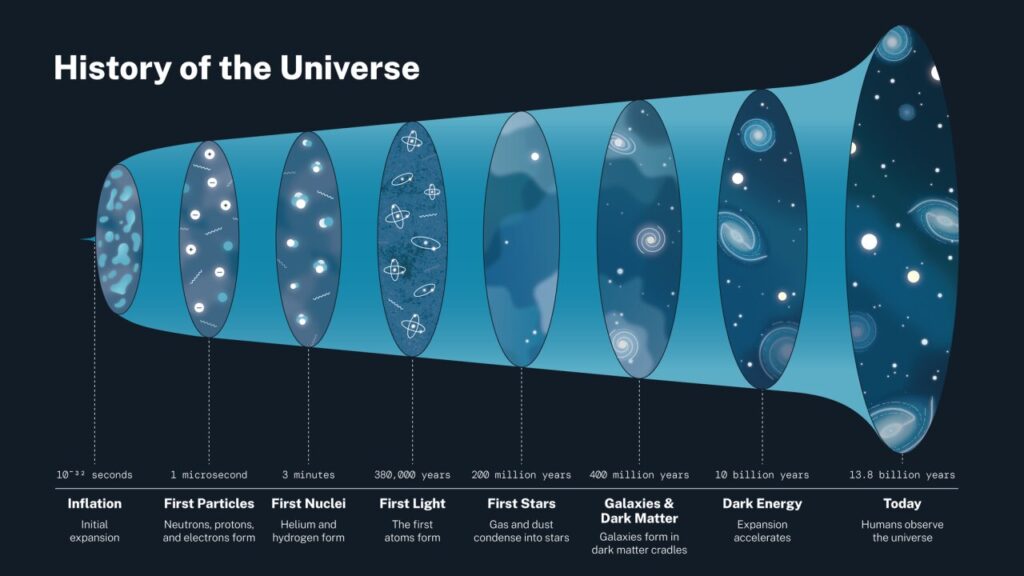
The universe’s expansion is a mystery that has captivated scientists for decades. Recent findings from the South Pole Telescope suggest that dark energy, a force responsible for the universe’s accelerating expansion, may be evolving. This revelation could inspire a new model of the universe, challenging long-held cosmological theories.
The Big Bang, which occurred approximately 13.8 billion years ago, marked the universe’s inception. Since then, the universe has been expanding, a phenomenon initially observed by astronomers in the late 1920s. However, it was not until 1998 that scientists discovered this expansion was accelerating, a finding that led to the hypothesis of dark energy.
Unveiling the Mysteries of Dark Energy
Dark energy is a mysterious force that constitutes nearly 70% of the universe. Unlike ordinary matter and dark matter, which exert gravitational pull, dark energy appears to have a repulsive effect, pushing the universe apart. The simplest explanation for dark energy has been Einstein’s cosmological constant, a concept he introduced to maintain a static universe model, which he later abandoned.
The South Pole Telescope, equipped with 16,000 detectors, has provided new insights into this enigmatic force. Over two years, the research team mapped 1/25th of the sky, focusing on the cosmic microwave background (CMB), a remnant radiation from the early universe. These observations have refined our understanding of dark energy and its role in cosmic expansion.
Challenging the Lambda-CDM Model
The current cosmological model, known as Lambda-CDM, combines dark matter and dark energy to explain the universe’s structure and expansion. According to this model, dark matter forms dense regions that attract ordinary matter, leading to the formation of galaxies and stars.
However, the new data from the South Pole Telescope, combined with findings from the Dark Energy Spectroscopic Instrument (DESI), suggest that dark energy might be weakening over time. This evolving nature of dark energy challenges the static cosmological constant and hints at a dynamic universe.
“If the current hints that dark energy is weakening are supported by further research, it will mean that we need to go beyond the cosmological constant,” scientists explain.
The Implications of an Evolving Universe
The potential evolution of dark energy has significant implications for our understanding of the universe. If dark energy is indeed changing, it could alter the fate of the universe, possibly slowing or even reversing its expansion in the distant future. This possibility necessitates a re-evaluation of existing cosmological theories.
Experts are cautiously optimistic about these findings. While the evidence for evolving dark energy is compelling, it is not yet conclusive. The scientific community adheres to a rigorous standard of proof, requiring a statistical significance of 5 sigma, or less than a 1 in 3.5 million chance of being false, before accepting new theories.
Future Research and Technological Advances
The quest to understand dark energy continues with planned upgrades and new experiments. The DESI collaboration is preparing for an advanced instrument, DESI-2, and aims to conduct a more ambitious spectroscopy experiment, Spec-S5. Similarly, the South Pole Telescope will receive an upgraded receiver in 2028, enhancing its observational capabilities.
Meanwhile, the Simons Observatory is set to begin survey observations soon, and the CMB-S4 experiment is slated for the 2030s. These initiatives promise to provide more data, potentially confirming or refuting the current hints of evolving dark energy.
“Sometime along this track, we will hopefully have enough evidence to definitively say if the accelerating expansion of the universe is truly losing steam,” researchers anticipate.
Looking Ahead: A New Model of the Universe?
The evolving nature of dark energy could herald a paradigm shift in cosmology. As scientists gather more evidence, the possibility of revising Einstein’s theory of relativity or developing a new model of the universe looms large. Such advancements would not only deepen our understanding of the cosmos but also inspire future generations of astronomers and physicists.
For now, the scientific community remains focused on gathering data and refining their models. As technology advances and our observational capabilities improve, the answers to these cosmic questions may finally come into view, reshaping our understanding of the universe and our place within it.







